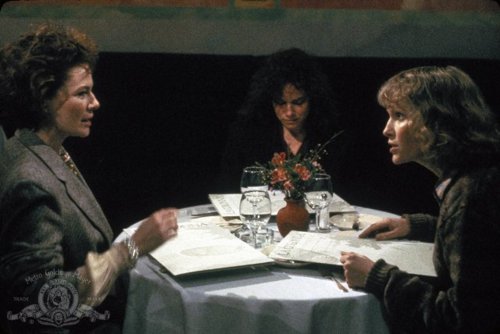Hannah and Her Sisters (1986)

One of Woody Allen’s (The Purple Rose of Cairo, Broadway Danny Rose) finest films, Hannah and Her Sisters sees the esteemed filmmaker return to Manhattan to deliver one of his most insightfully satisfying stories yet. At its core, a serious film, borrowing a bit from the style of Chekhov’s “Three Sisters”, as well as one of Allen’s main filmmaking influences, Ingmar Bergman. But still quite original, with Allen’s trademark witticisms, neurotic behavior, and ability to find humor even in the most trying of circumstances.
Hannah tells several storylines involving, you guessed it, Hannah (Farrow, Supergirl), and her two younger sisters, Lee (Hershey,The Stunt Man) and Holly (Wiest, Radio Days). Much of the main storyline revolves around Hannah’s husband, Elliott (Caine, Dressed to Kill), who has developed an infatuation with Lee to the point where he can hardly contain it any longer. Lee is involved with an older man, an artist named Frederick (von Sydow, Dreamscape), though the two are an improbable fit. Meanwhile, would-be actress Holly is having a difficult time in life and in love, especially as she has little money and a drug habit that certainly isn’t helping. Allen plays TV producer Mickey, Hannah’s ex-husband whose such a hypochondriac, that he talks himself into believing that he has an inoperable brain tumor due to a momentary loss in hearing in one of his ears.
Rich with acute characterizations and subtle-but-profound insights, Hannah and Her Sisters plays like a novel adaptation, though it is a wholly original screenplay. Although the film doesn’t follow a straightforward narrative from beginning to end, it’s barely noticeable, even when we aren’t sure how these stories will tie together. Allen utilizes a few techniques to keep it cohesive, from voice-over thoughts of several of the main characters that fill in the blanks of just who they are and where they are in life, and pithy title cards full of interesting quotes that serve to keep the scenes separated, but also unified under common themes of the fleeting, fickle, but self-assuring nature of love.
Every character, all of whom are aspiring or successful artists of a certain type, is nuanced and bring forth their own insights; even bit roles such as Frederick, the artist who is completely different than any other character in the film, expounding on how he can’t sell his work to someone who only sees if for how it will work with his existing household decor. The film plays into the themes of how people are motivated to action by either fears or desires, and how stagnation often results in scenarios that aren’t wished for. Frederick is content to let things ride in their relationship, eschewing Lee’s desire for marriage until it’s too late, while Lee herself sticks in a relationship she knows is wrong for her.
Elliott is stuck between stations of desiring Lee, but when he has the chance to get her, he finds his fear of hurting Hannah keeps him avoiding a decision altogether, basically refusing to do anything until the decision is made for him. Mickey, only when facing life’s ultimate end, does he decide to do all of the things he thinks one should do in life. In one of Allen’s prodigious flourishes, it is not through religion that Mickey finds a way to cope, but rather, through a screening of the Marx Brothers’ Duck Soup, wherein he realizes that to live a life of fulfillment, one it not required to find meaning in it, but rather, to simply enjoy it as much as one can.
Hannah and Her Sisters is one of Allen’s richest of films, and so subtle in its artistry that it is one that can be revisited again and new discoveries can be made, not only regarding the film, but of how we perceive our own lives. The film features Thanksgiving in both its opening moments as well as in closing, which is fitting considering that these characters eventually have reason to be thankful for what they do have. So too should we be thankful for this thought-provoking, poignant, deceptively effortless comedy that would garner 7 Academy Award nominations, including Best Picture, scoring three for its screenplay and the supporting performances of Caine (is he really a supporting actor in this?) and Wiest.
Qwipster’s rating: A
MPAA Rated: PG-13 for some sexual references and a scene of drug use
Running time: 103 min.
Cast: Michael Caine, Mia Farrow, Barbara Hershey, Woody Allen, Dianne Wiest, Carrie Fisher, Max von Sydow, Maureen O’Sullivan, Lloyd Nolan, Julie Kavner
Small role: Lewis Black, Julia Louis-Dreyfus, J.T. Walsh, John Turturro, Richard Jenkins, Joanna Gleason, Daniel Stern, Bobby Short, TOny Roberts, Sam Waterston, Soon-Yi Previn
Director: Woody Allen
Screenplay: Woody Allen
